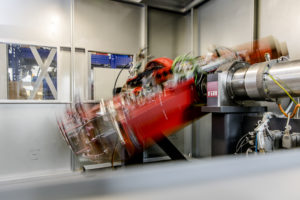Rotational Molding

Rotational molding, also known as rotomolding or rotocasting, is a plastic processing method to produce seamless hollow parts. Typical applications of the technology are tanks or housings for machines. Parts with volumes of up to several thousand liters and complex geometries are possible. In the rotational molding process a hollow mold is partially filled with a polymer in liquid or powder form. The mold rotates about two axes, is heated up and subsequently cooled down during the rotation. Thereby, a hollow plastic part forms on the inner mold wall. The whole process takes place at ambient pressure which leads to low mechanical loads and thus very cost-efficient molds. As a result the technology is economically interesting especially for small and medium lot sizes. In industrial applications the material used by far the most in rotational molding is polyethylene. Over 80 % of the processed material accounts for the different polyethylene types.
Research work at Institute of Polymer Technology focuses on, among others, the characterization of alternative materials and thereby on improvements in part properties. Expanding the range of materials enables a multitude of new applications for rotational-molded parts. Particularly the use of engineering thermoplastics has the potential to create new technical applications for rotational molding technology.
Aryan Oktaee, M.Sc.
Institute of Polymer Technology
Processing
- Phone number: +49 9131 85-71086
- Email: aryan.oktaee@fau.de
